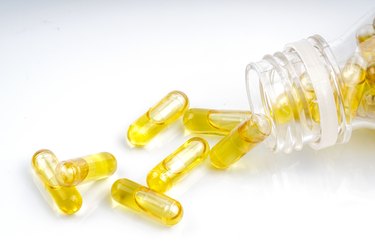
It's important for teenagers to get all the necessary vitamins daily. However, several vitamins are particularly important for growth, development and sustained energy levels. Fill your diet with a variety of vitamin-rich foods to get plenty of vitamins, as well as other nutrients, without having to worry about taking dietary supplements.
Read more: Examples of Foods That Contain Vitamins
Video of the Day
Video of the Day
If you have concerns about the adequacy of your diet, talk to your doctor for recommendations on specific vitamins or whether you would benefit from multivitamins.
Tip
If you eat a diet filled with nutritious foods, you don't need to take any vitamins.
Vitamin D for Healthy Bones
While your major growth spurts are likely over in the latter half of your teens, your skeleton is still developing. Vitamin D improves the ability of your bones and teeth ability to take in calcium, making them strong and sturdy. Plus, vitamin D is essential for cell growth, which happens frequently and quickly during your teens. Your body stores some of this fat-soluble vitamin, although you still need it regularly.
Fifteen- to 19-year-old boys and girls need 600 international units —15 micrograms — of vitamin D every day. Vitamin D-fortified milk and yogurt are a quick way to get vitamin D into your system. You'll even get vitamin D from fortified breakfast cereals and orange juice. Tuna, salmon, swordfish, sardines and eggs are alternative natural sources of this vitamin.
Read more: Foods With High Vitamin D
Collagen-Building Vitamin C
Vitamin C is another essential nutrient for normal growth. Bones and muscles are held together by tendons and ligaments, which are made up of collagen, a soft connective tissue. Bones themselves even have a small amount of collagen. The connective tissue allows wounds to heal and makes up part of your skin too. C is a water-soluble vitamin, which means it isn't stored in your body.
Males between 15 and 19 years of age should get 75 milligrams daily; females need 65 milligrams. Vitamin C is readily available in produce and 100 percent juices, so you should get what you need from your diet. Oranges, grapefruits, kiwifruits, strawberries, bell peppers, broccoli and tomatoes are just a few vitamin C-rich foods.
Folic Acid Essential for Cell Division
As cells develop, they divide and form a genetic core that signals which type of cell they will become and which jobs they are responsible for. One B vitamin called folic acid, also known as folate, aids in cell division and forms the DNA and RNA found in cells. Because these steps occur quickly while you're growing, having enough water-soluble folate in your diet each day is important to support these cellular functions.
If you're 15 to 19 years old, take 400 micrograms of folic acid per day. Fortified breakfast cereals and breads usually have lots of folic acid. Legumes, beans, rice, Brussels sprouts, lettuce, avocados, spinach and broccoli are other sources of the vitamin.
Vitamins B12 and B6
Water-soluble B12 and B6 are responsible for making red blood cells and hemoglobin, a protein in your blood that transports oxygen. B12 and B6 are two of the B vitamins that are crucial for maintaining your energy levels too. They metabolize carbs, fats and protein from foods and supplements, giving you the push you need to make it through class or your afternoon job.
Take 2.4 micrograms of B12 each day — it doesn't change based on gender. Teen boys between 15 and 19 years require 1.3 milligrams of B6, while girls of this age need 1.2 milligrams. Meat, fish and poultry are full of these B vitamins. With the exception of fortified breakfast cereals, B12 comes mainly from animal sources, but B6 is found in potatoes, bananas, nuts, enriched rice and squash.
- Oregan State University: Linus Pauling Institute: Vitamin C
- National Institutes of Health: Office of Dietary Supplements: Vitamin D
- National Institutes of Health: Office of Dietary Supplements: Folate
- National Institutes of Health: Office of Dietary Supplements: Vitamin B12
- National Institutes of Health: Office of Dietary Supplements: Vitamin B6
- U.S. News Health: Do Teenagers Need Vitamins of Their Own?